Rising violence takes huge psychological toll in Rio favelas
Almir Arruda rode his bicycle quickly across the City of God slum in Rio de Janeiro when he heard there was a shootout between drug traffickers and police near his 4-year-old daughter’s preschool.
Arruda, a 43-year-old unemployed construction worker, arrived to find children and teachers lying on the floor to protect themselves as the pounding of bullets continued nearby. He scooped up daughter Jamile, who look terrified, and they rode the bike a few blocks until Arruda stopped to wait out the shooting — and started crying.
“If it hits me I don’t care, but what if it hits her?” Arruda said, talking about stray bullets through tears and over the sounds of gunshots close by. “I feel like a prisoner in the community.”
Amid a sharp increase in violence in favelas, or slums, millions of Rio residents are facing daily stresses akin to those in a war zone. Heavily armed drug traffickers battle for control of many favelas, and violent police operations add to the death toll and sense of fear. Last year, 920 people died during police raids or patrols in Rio state, more than double the 413 in 2013, according to Rio’s Public Security Institute. And this year’s figure is up by almost 60 percent over 2016.
Text by Yesica Fisch and Leo Correa/AP
Read more:
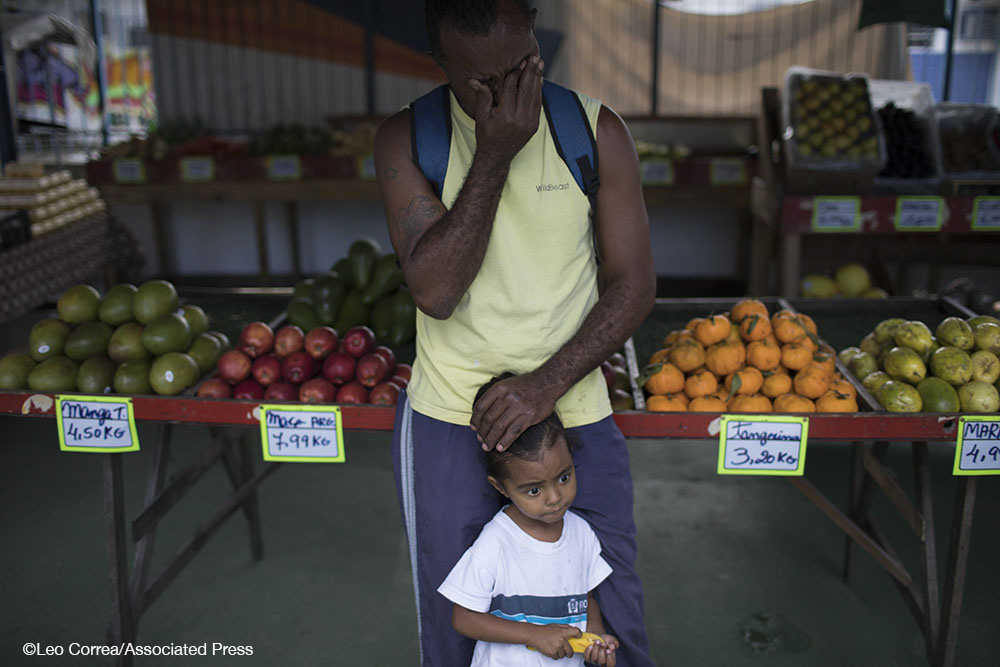
In this June 12, 2017 photo, Almir Arruda, 43-year-old cries as he waits the shooting to stop with his daughter Jamile, 4-year-old, during a confront between police and alleged drug traffickers in City of God slum in Rio de Janeiro, Brazil. “If it hits me I don’t care, but what if it hits her?” Arruda said, talking about stray bullets through tears and over the sounds of gunshots close by. “I feel like a prisoner in the community.” (AP Photo/Leo Correa)
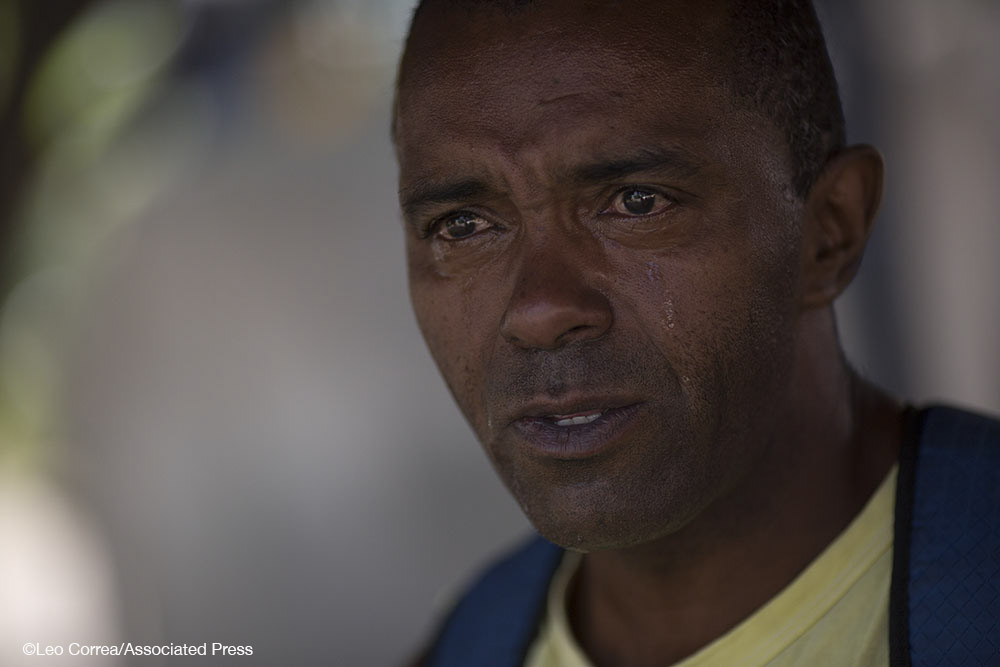
In this June 12, 2017 photo, Almir Arruda, 43-year-old cries as he waits the shooting to stop with his daughter Jamile, 4-year-old, during a confront between police and alleged drug traffickers in City of God slum in Rio de Janeiro, Brazil. “If it hits me I don’t care, but what if it hits her?” Arruda said, talking about stray bullets through tears and over the sounds of gunshots close by. “I feel like a prisoner in the community.” (AP Photo/Leo Correa)
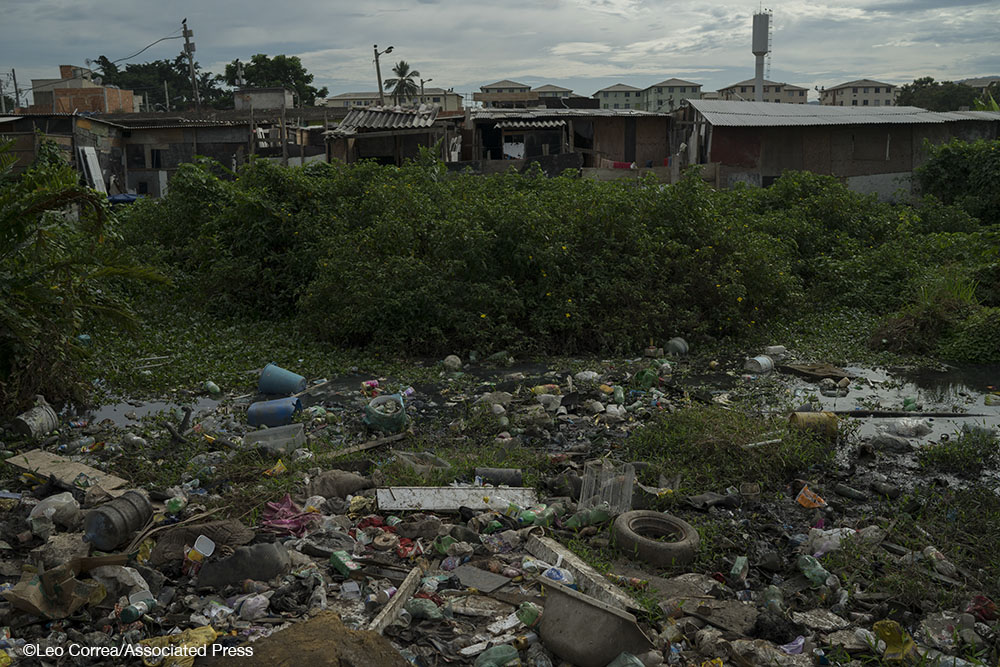
In this June 6, 2017 photo, open sewage covered by trash is seen in the City of God slum in Rio de Janeiro, Brazil. Despite proximity to wealth, government services are practically non-existent. Parts of the slum are covered with garbage and the stench of sewage permeates the air. (AP Photo/Leo Correa)
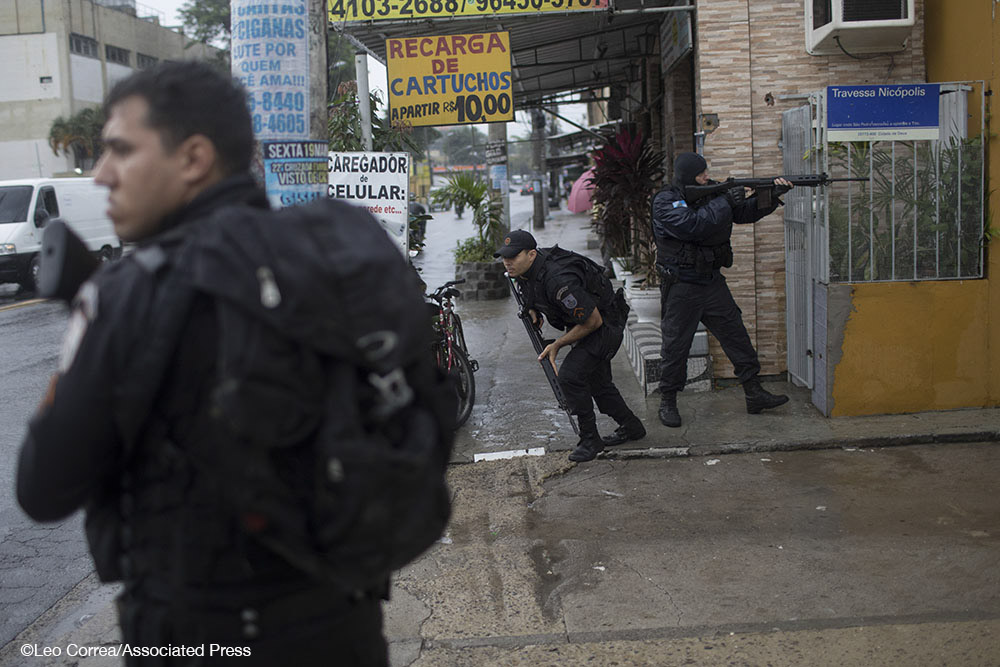
In this June 21, 2017 photo, police officers take positions during a police operation against drug traffickers in City of God slum in Rio de Janeiro, Brazil. Last year, 920 people died during police patrols or operations in the state, more than double the 413 in 2013, according to Rio’s Public Security Institute. Between January and April of this year, 383 were killed during police patrols or operations, a 59 percent increase over the same period last year. (AP Photo/Leo Correa)

In this June 12, 2017 photo, Almir Arruda, 43-year-old drives his bike with his daughter Jamile, 4-year-old, during a morning of confront between police and alleged drug traffickers in City of God slum in Rio de Janeiro, Brazil. “If it hits me I don’t care, but what if it hits her?” Arruda said, talking about stray bullets through tears and over the sounds of gunshots close by. “I feel like a prisoner in the community.” (AP Photo/Leo Correa)

In this June 9, 2017 photo, a white “caveirao,” armored vehicle used by the police, suddenly appears in an alley of City of God slum in Rio de Janeiro, Brazil. Amid a sharp increase in violence in favelas, or slums, millions of Rio residents are facing daily stresses akin to those in a war zone. (AP Photo/Leo Correa)

In this June 9, 2017 photo, Thaisa da Silva Ribeiro calms his 4-year-old son Isaac, right, and the sister, 2-year-old Isadora as her husband Silvio Cesar Soares Gonzaga stands with them after a white “caveirao,” or a light armored vehicle appeared in an alley of City of God slum in Rio de Janeiro, Brazil. In war zones, children and adults can suffer post-traumatic stress disorder, anxiety, nightmares, insomnia and other psychological disorders. (AP Photo/Leo Correa)
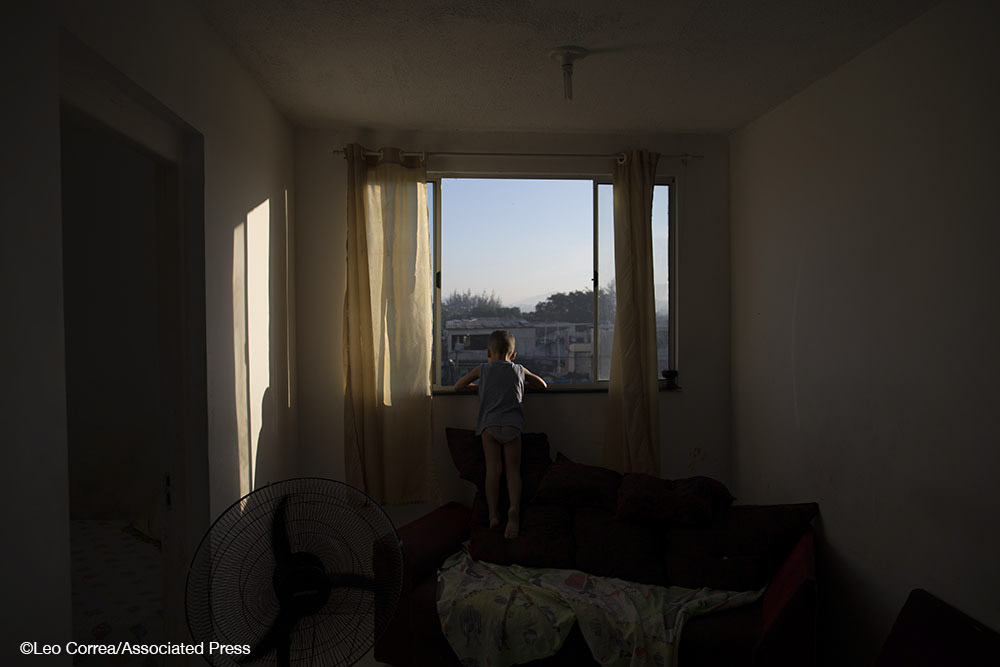
In this June 8, 2017 photo, Isaac's, 4-year-old kid peeks out the window of his apartment in City of God slum in Rio de Janeiro, Brazil. "There are a lot of shootings here” commented Isaac. In war zones, children and adults can suffer post-traumatic stress disorder, anxiety, nightmares, insomnia and other psychological disorders. Those symptoms are being observed in residents of slums, particularly children, according to health experts at Fiocruz, one of Brazil’s top research institutes that is currently conducting a large study on health issues related to urban violence in Rio. (AP Photo/Leo Correa)
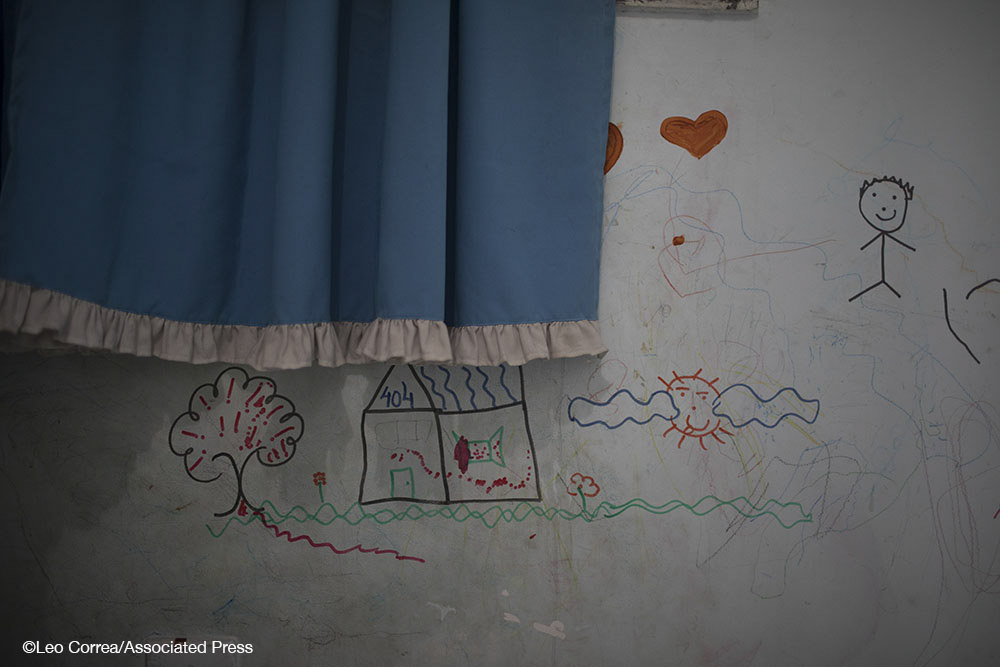
In this June 10, 2017 photo, a drawing of a house is seen on the wall of Isaac's room in City of God slum in Rio de Janeiro, Brazil. "There are a lot of shootings here” commented 4-year-old kid while playing in his room, where he and his mother, Thaisa drew a house, a garden and hearts on the wall of the apartment located near an open sewage channel. (AP Photo/Leo Correa)
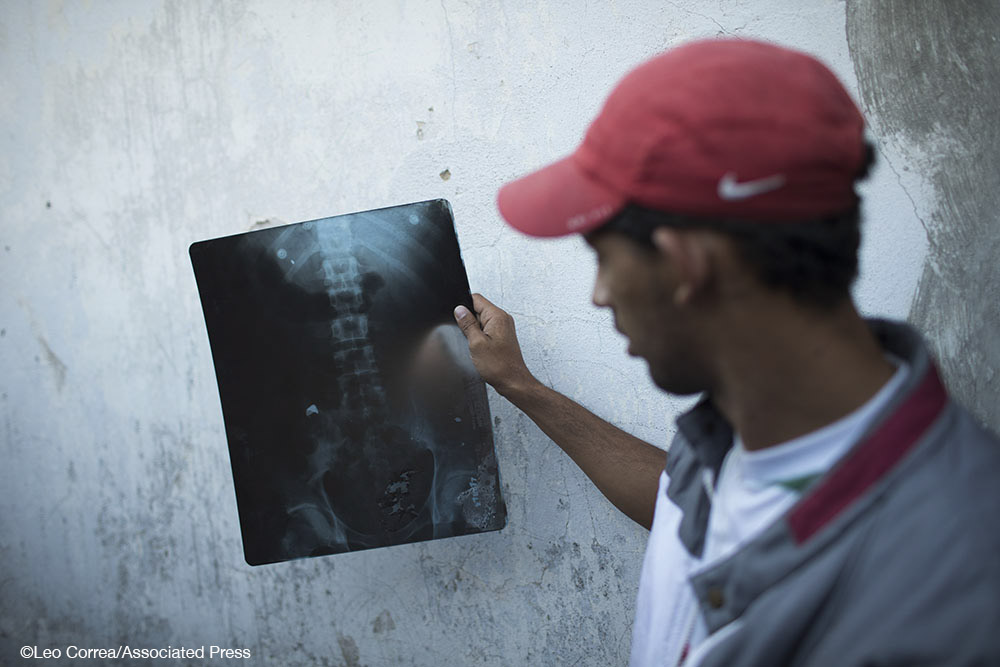
In this June 10, 2017 photo, Alexandre Henrique da Cruz Correia, 29-year-old holds up the X-ray that shows where one of the bullets is still lodged in back of his left hip in the City of God slum in Rio de Janeiro, Brazil. 45 percent of the residents fear that police will confuse them with criminals, and 75 percent believe the police act more violently in favelas than in richer residential or touristy areas, according to a survey by the Center for the Study of Safety and Citizenship at Rio’s Candido Mendes University. (AP Photo/Leo Correa)
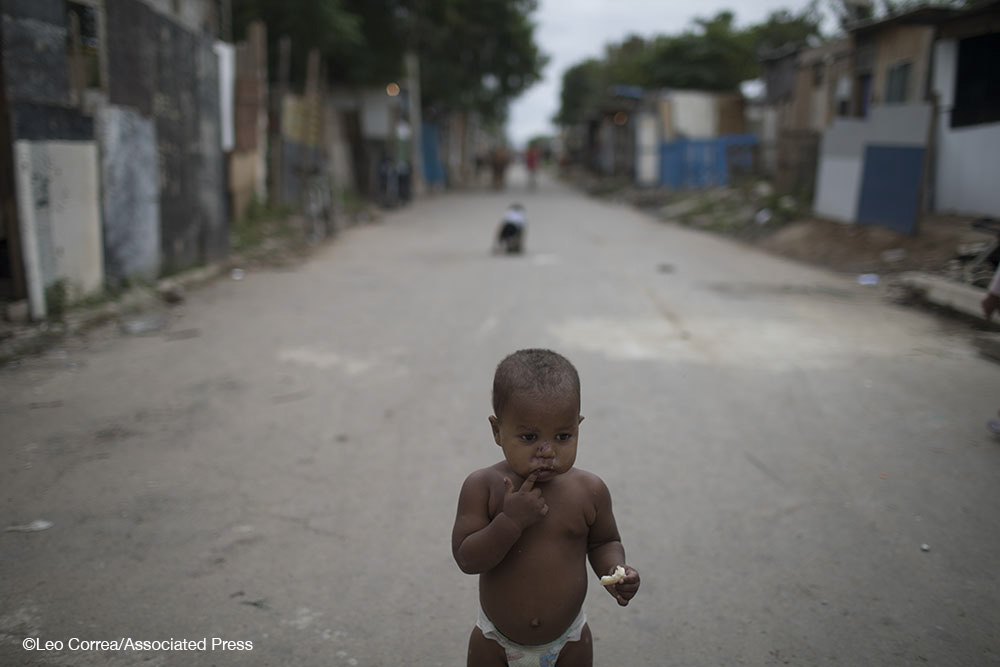
In this June 10, 2017 photo, a baby holds a piece of bread as he stands on a street if the Cantinho do Ceu that reads in Portuguese "Heaven's corner", one of the poorest area of City of God slum in Rio de Janeiro, Brazil. Despite proximity to wealth, government services are practically non-existent. Parts of the slum are covered with garbage and the stench of sewage permeates the air. (AP Photo/Leo Correa)

In this June 10, 2017 photo, a man serves a client at his barber shop of the Cantinho do Ceu that reads in Portuguese "Heaven's corner", one of the poorest area of City of God slum in Rio de Janeiro, Brazil. Residents say that the economic crisis is adding to a sense of desperation. The state of Rio de Janeiro has been particularly hard hit. Unemployment in the state jumped from 4 percent in 2013 to 13 percent in 2016, leaving thousands with no income and living in abject poverty. (AP Photo/Leo Correa)
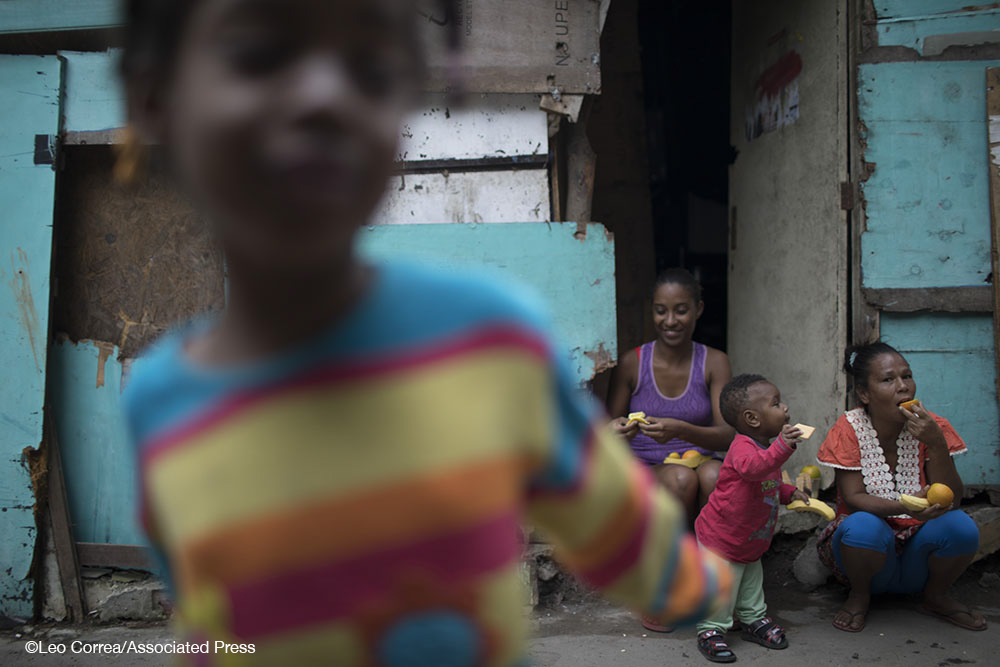
In this June 10, 2017 photo, people eat some fruits that were distributed by a NGO in one of the poorest area of City of God slum in Rio de Janeiro, Brazil. Residents say that the economic crisis is adding to a sense of desperation. The state of Rio de Janeiro has been particularly hard hit. Unemployment in the state jumped from 4 percent in 2013 to 13 percent in 2016, leaving thousands with no income and living in abject poverty. (AP Photo/Leo Correa)

In this June 7, 2017 photo, a father stands with his kid at the entrance of a school which has written in Portuguese on the wall on left, "Police will die in double" at the City of God slum in Rio de Janeiro, Brazil. Amid a sharp increase in violence in favelas, or slums, millions of Rio residents are facing daily stresses akin to those in a war zone. There are frequent shootouts between police and heavily armed drug traffickers. (AP Photo/Leo Correa)
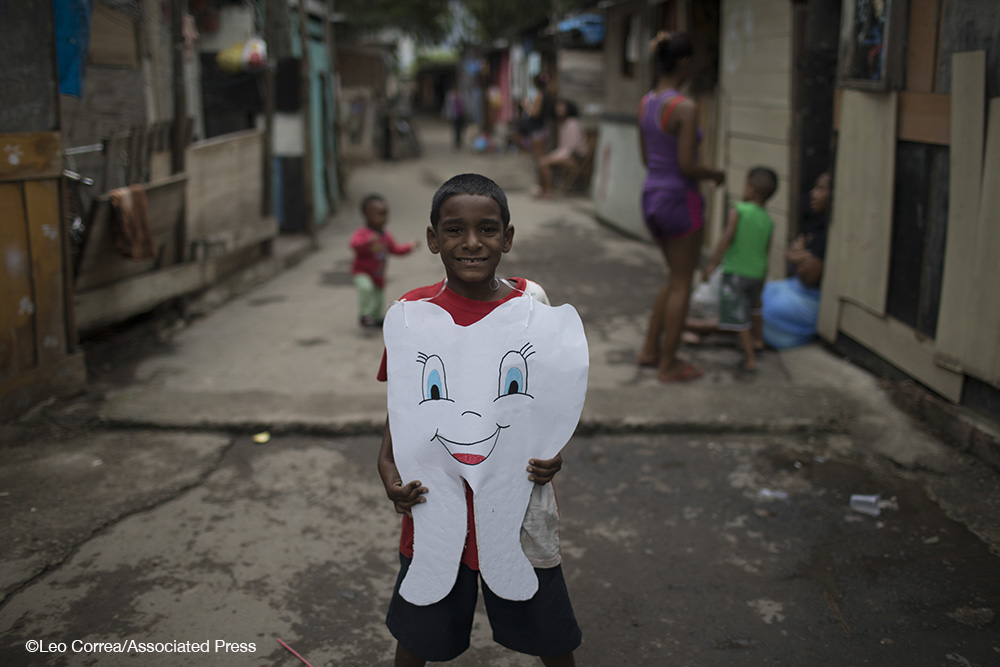
In this June 10, 2017 photo, a kid poses for the picture wearing a health tooth costume that was given by a NGO in one of the poorest area of City of God slum in Rio de Janeiro, Brazil. For Leonardo Bueno anxiety and depression from the violence are compounded by the feeling that the state has abandoned poor areas.
“All of that increases the level of illness in an area,” says one of the researchers at Fiocruz, one of Brazil’s top research institutes that is currently conducting a large study on health issues related to urban violence in Rio. (AP Photo/Leo Correa)
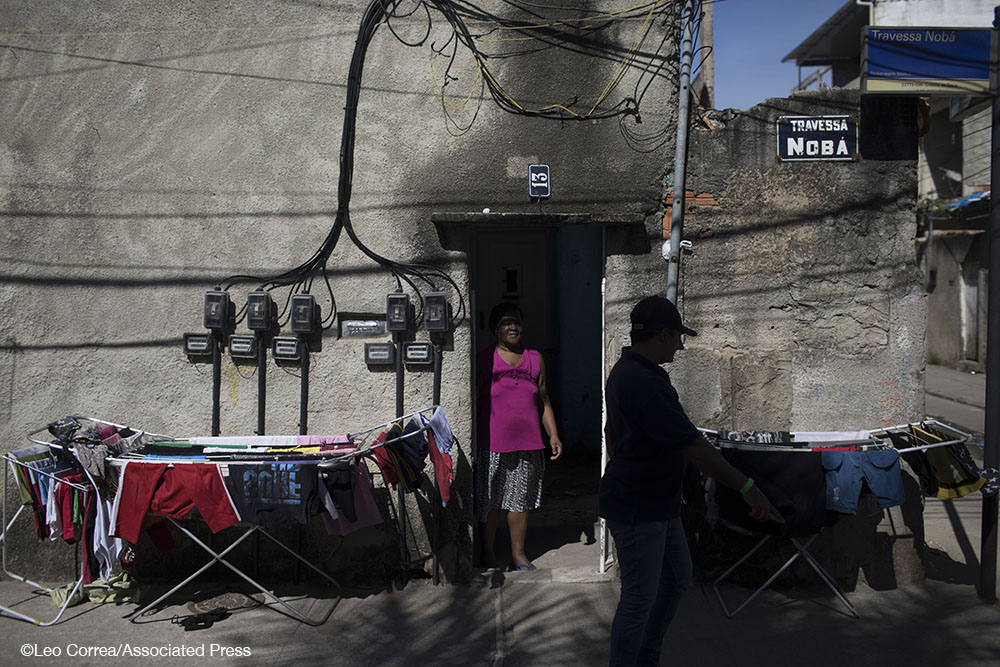
In this June 8, 2017 photo, Silvio Cesar Soares Gonzaga, 46-year-old, silhouetted at right, walks past house of the old lady Celina that helped him after he left the drug trafficker life in City of God slum in Rio de Janeiro, Brazil. Gonzaga suffered hungry and poverty when he was a child and -like his 9 brothers and sisters, 3 of whom died- get involved with the drug traffickers and later left that world to attend an evangelical church. (AP Photo/Leo Correa)
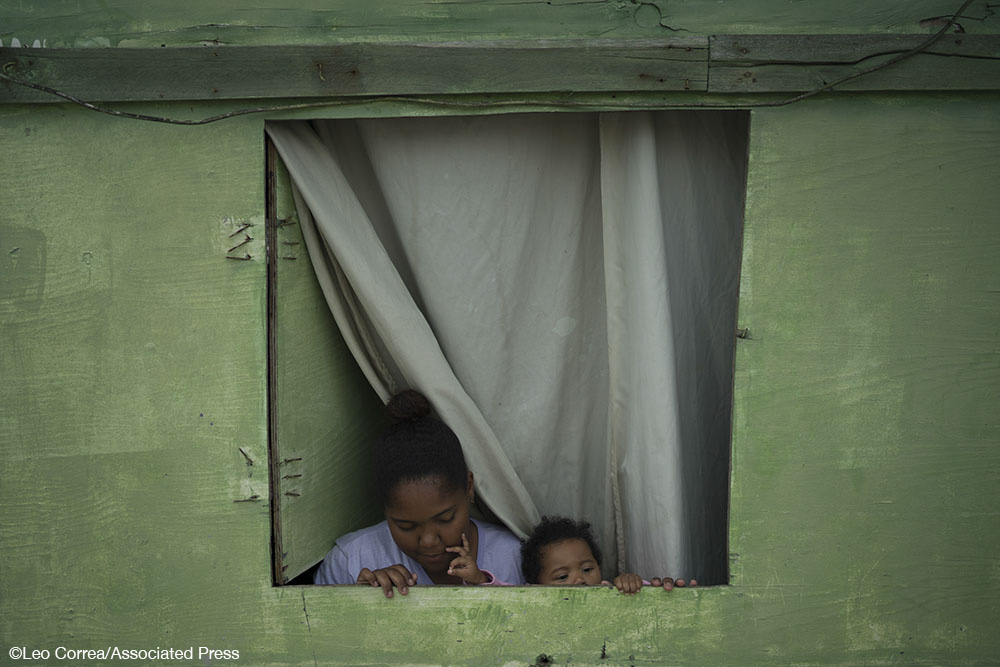
In this June 6, 2017 photo, Suzi Souza dos Santos, 26-year-old and her baby Maria Lais stand at the window of their small wooden house in one of the poorest areas of City of God slum in Rio de Janeiro, Brazil. During a shootout, she and her family goes to a neighbor’s house made of bricks. “We have nowhere else to go when we are caught in the crossfire,” she said. (AP Photo/Leo Correa)

In this June 12, 2017 photo, poor people hold hands in pray before they eat a free meals provided by Ana Regina de Jesus in the City of God slum in Rio de Janeiro, Brazil. Only about 60 of the normally 150 showed up because of a nearby shooting in the morning. “Stray or found bullets will not reach you” ,said the strong 58-year-old woman that distributes the meal four days per week. (AP Photo/Leo Correa)
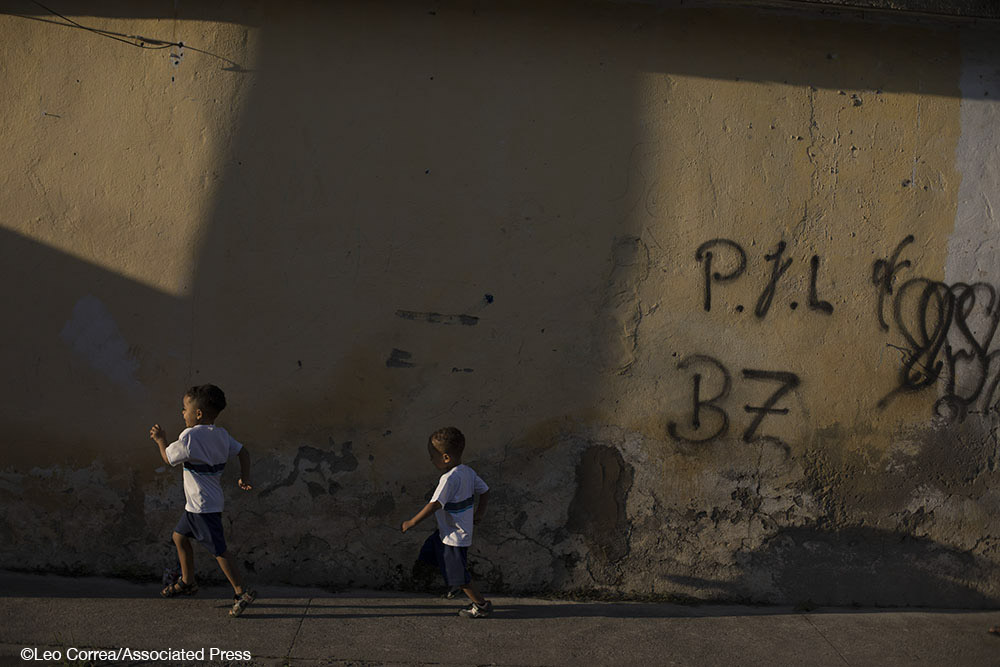
In this June 7, 2017 photo, kids go to the school as the day starts at the City of God slum in Rio de Janeiro, Brazil. While teeming with residents, even during the day the streets are often empty because violence can erupt at any point _ residents even complain that many police operations happen while children are in school. (AP Photo/Leo Correa)
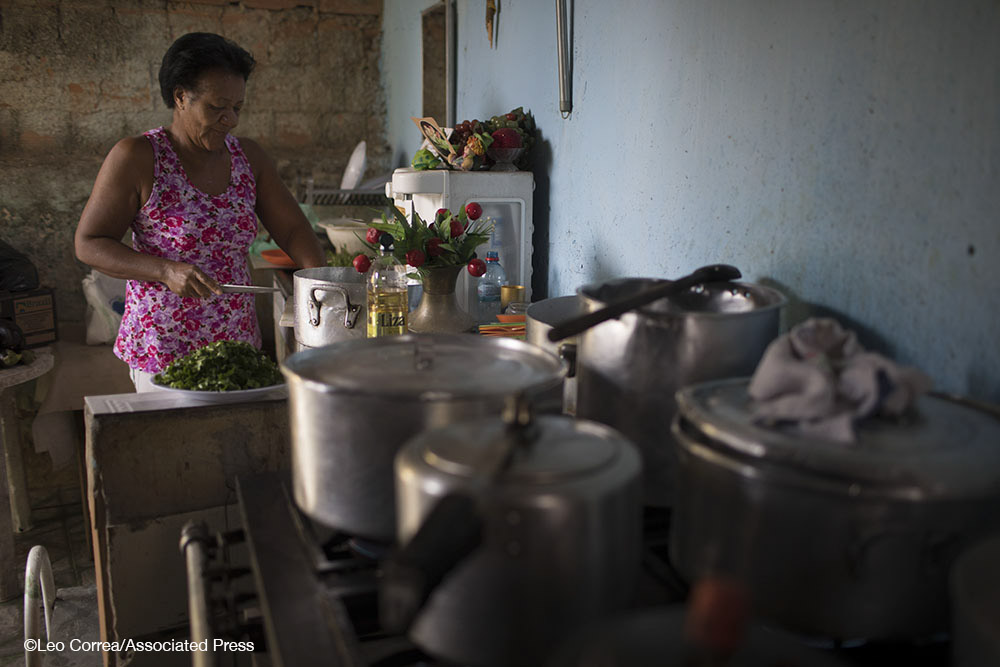
In this June 12, 2017 photo, Ana Regina de Jesus, 58-year-old, prepares the meals that will be distributed to the poor people of the the City of God slum in Rio de Janeiro, Brazil. For more than 20 years Jesus has been providing free meals four days a week and this day only about 60 of the normally 150 showed up because of a nearby shooting in the morning. (AP Photo/Leo Correa)

In this June 10, 2017 photo, kids observes the alley from their shack home at a place well known as Cantinho do Ceu that reads in Portuguese "Heaven's corner" that is one of the poorest area of City of God slum in Rio de Janeiro, Brazil. Residents say that the economic crisis is adding to a sense of desperation. Unemployment in the state jumped from 4 percent in 2013 to 13 percent in 2016, leaving thousands with no income and living in abject poverty. (AP Photo/Leo Correa)
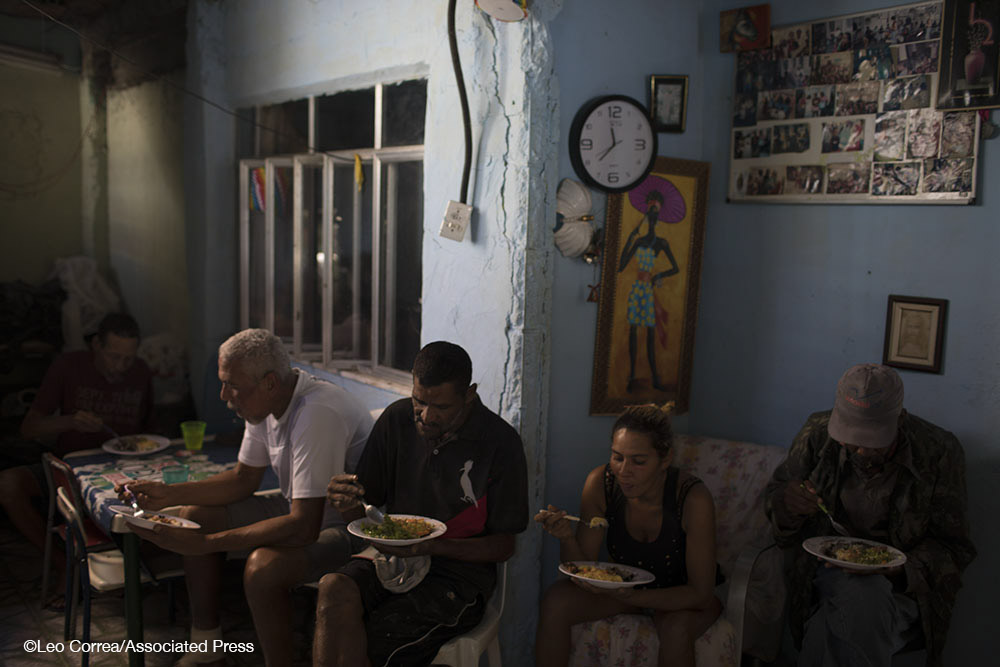
In this June 12, 2017 photo, poor people eat the free lunch in the house of Ana Regina de Jesus, 58-year-old in the City of God slum in Rio de Janeiro, Brazil. “ I feel so bad” Ana Regina said, “These thing should not happen but what can we do? we cannot change the world", completes. (AP Photo/Leo Correa)
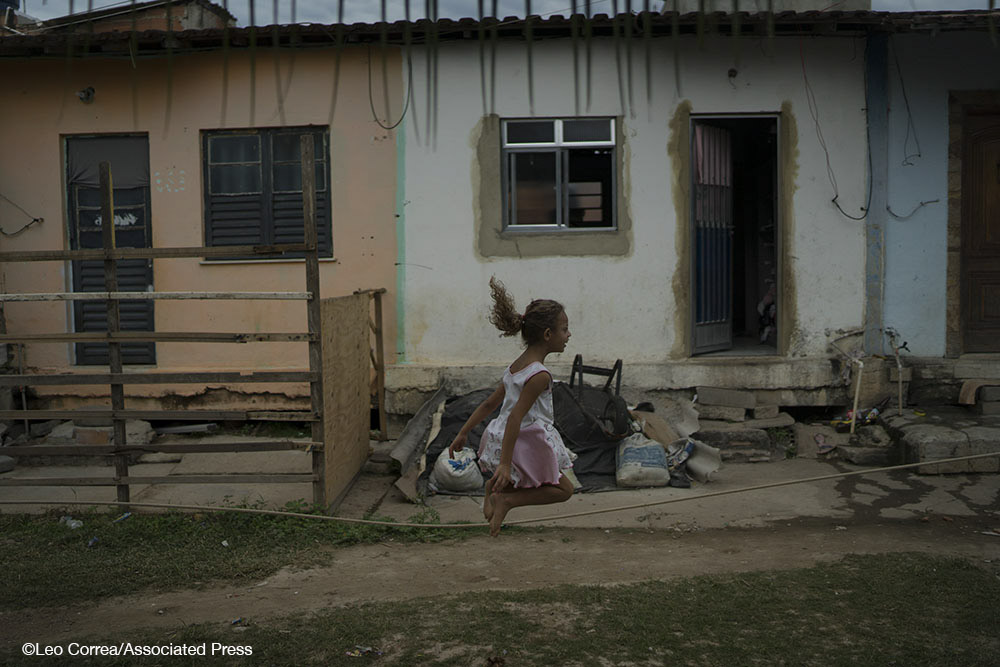
In this June 8, 2017 photo, A girl jumps rope as she plays in one of the poorest areas of City of God slum in Rio de Janeiro, Brazil. Amid a sharp increase in violence in favelas, or slums, millions of Rio residents are facing daily stresses akin to those in a war zone. There are frequent shootouts between police and heavily armed drug traffickers. (AP Photo/Leo Correa)






















